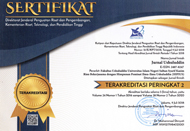This journal has been cited by 79 citations (up to 21 April 2024). The citations are from Indonesia (68), Malaysia (12), Australia (3), Turkey (3), United Kingdom (2), United States (2), Canada (1), Egypt (1), Hungary (1), India (1) and Netherlands (1).
User
ADDITIONAL MENU
Keywords
Agama
Al-Qur’an
Epistemology
Gender
Hadis
Hadith
Hermeneutic
Hermeneutika
Islam
Islamic Thought
Muhammadiyah
Muslim
Paradigma
Pemikiran
Penafsiran
Reinterpretation
Religion
Science
Tafsir
al-Qur’an
hadis
Language



















 Fakultas Ushuluddin UIN SUSKA Riau Jl. H.R. Soebrantas KM. 15,5 Panam – Pekanbaru
Fakultas Ushuluddin UIN SUSKA Riau Jl. H.R. Soebrantas KM. 15,5 Panam – Pekanbaru E-mail: jurnal.ushuluddin@uin-suska.ac.id
E-mail: jurnal.ushuluddin@uin-suska.ac.id